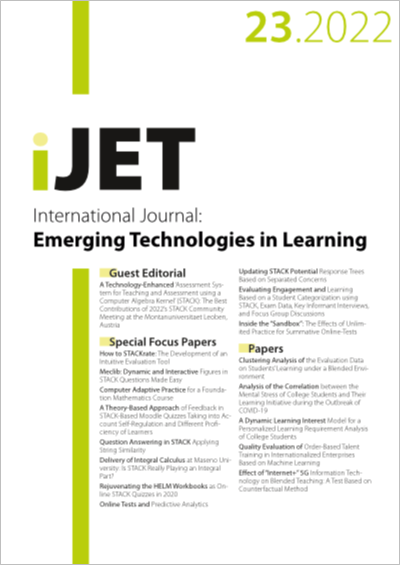A Dynamic Learning Interest Model for a Personalized Learning Requirement Analysis of College Students
DOI:
https://doi.org/10.3991/ijet.v17i23.35937Keywords:
personalized learning, learning requirement, dynamic learning interest (DLI), time series modelAbstract
The randomness in college students’ participation of online learning causes common problems such as improper learning resource allocation or unbalanced supply and demand to online education platforms, thus scientifically predicting college students’ learning requirements, triggering their dynamic learning interest, and effectively improving their learning effect are important prerequisites for ensuring these platforms to develop stably, efficiently, and sustainably. Existing prediction models generally ignored the progressing process of learning and failed to comprehensively model or analyze from multiple dimensions such as resource utilization, learning behavior, learning pattern, teaching mode, and teaching management, etc. To fill in this research gap, this paper proposed a Dynamic Learning Interest (DLI) model for analyzing the personalized learning requirements of college students. Based on the college students’ online learning cycles and the learning cycle division results, a time series DLI model was established for studying the prediction of college students’ personalized learning requirements, and short-term prediction and comparative experiment were carried out accordingly. Then, the proposed model was subject to stability test and white noise test to determine the model structure and estimate it parameters. At last, significance test was performed on the proposed model and its parameters, and the results verified the effectiveness of the model.
Downloads
Published
How to Cite
Issue
Section
License
Copyright (c) 2022 Nan Zhang (Submitter); Fei Wang, Mengqing Han, Peijia Wei

This work is licensed under a Creative Commons Attribution 4.0 International License.


